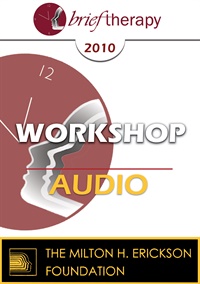BT10 Workshop 46 - The Initiator-Inquirer Process: Not a Communication Technique - Ellyn Bader, PhD
- Average Rating:
- Not yet rated
- Topic Areas:
- Workshops | Communication | Behavioral Therapy
- Categories:
- Brief Therapy Conference | Brief Therapy Conference 2010 | Pioneers in Couples and Family Therapy
- Faculty:
- Ellyn Bader, PhD
- Duration:
- 1:59:31
- Format:
- Audio Only
- Original Program Date:
- Dec 12, 2010
- License:
- Never Expires.
Description
Description: Discover the Initiator-Inquirer Process: A transformative approach to couples therapy that goes beyond communication skills. Learn to help couples uncover deeper relational dynamics, express vulnerabilities without blame, and develop genuine empathy. Includes practical techniques for working with complex relationship challenges, applicable in both long-term and brief therapy settings.
Syllabus Description: Couples come to therapy and say “we can’t communicate.” They want your help with communication. Yet effective communication often reveals trauma, accumulated resentment, narcissism or anxiety about intimacy. Resolution requires internal self development that may be resisted by one or both partners. This advanced workshop will use video and clinical transcripts to demonstrate the intricacies of resolving predictable communication breakdowns and supporting development.
Educational Objectives:
- Describe a continuum in the development of empathy during couples therapy.
- Demonstrate a communication process that illuminates developmental impasses.
- List three predictive communication breakdowns and how to resolve them.
*Sessions may be edited for content and to preserve confidentiality*
Credits
Handouts
| Timestamped Transcript (1.3 MB) | 33 Pages | Available after Purchase |
| Ericksonian Learning Snapshot (246.6 KB) | 2 Pages | Available after Purchase |
Faculty

Ellyn Bader, PhD Related Seminars and Products
Ellyn Bader, PhD, is a founder and director of The Couples Institute in Menlo Park, California. As a clinical psychologist, workshop leader, author, and speaker, she is dedicated to helping couples create extraordinary relationships. Over the past 30 years she has trained therapists in couples therapy throughout the United States as well as Europe, Asia, South America, and Australia. She served as a Clinical Faculty in Stanford University School of Medicine for 8 years.


